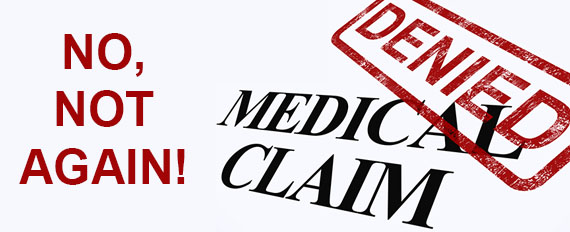Two of the biggest obstacles affecting healthcare reimbursements are insurance claim denials and insurance claim rejections. In the billing world the terms “claim rejection” and “claim denial” are often used interchangeably. Not having a concise understanding of these two obstacles can cause a significant, negative impact on your practice’s overall revenue cycle. Essential aspects for a timely cash flow include proper education and management of accounts receivable.
Claim Rejections
Claims Rejections are claims that fail to meet specific criteria and data requirements that are rejected by insurance companies.
Medical claims that are rejected can’t be processed by the insurance companies as they were never entered into their computer systems because of the data requirements that were not met.
Once the errors are corrected, a rejected claim can be resubmitted. These errors can be as simple as a transposed digit from the patient’s insurance ID number and can usually be rectified quickly.
Claim Denials
A denied claim is a completely different issue. Denied claims are defined as claims that were received and processed by the payer and a negative determination was made. A denied claim cannot simply be resubmitted. It must be determined why the claim was denied. Having that information available allows an appropriate appeal to be written or a reconsideration requested.
If this type of claim is resubmitted without an appeal or reconsideration request it will more than likely be denied as a duplicate, and the claim remains unpaid costing your practice even more time and money.
Why Are Claims Being Denied?
According to the American Medical Association’s National Health Insurer Report Card (NHIEC), that provides metrics on the timeliness, transparency and accuracy of claims processing of insurance companies, there are five major reasons for denied medical claims:
- Missing information- examples include even one field left blank, missing modifiers, wrong plan codes, incorrect or missing social security number.
- Duplicate claim for service.
- Service is already adjudicated – (unbundling) services. Benefits for a service are included within another service or procedure.
- Services not covered by payer. Before providing services, call payer to check details of eligibility and determine coverage requirements
- Limit for filing has expired. There are a set number of days following service for claim to be reported to the payer. If outside of that time period, the claim will be denied.
Improving Claim Rejections and Denial Rates
Whether your practice manages its medical billing and coding in-house or outsources to a medical billing company, there are steps that should be taken to manage rejections and denials:
- Staff education is of the utmost importance. Train billing staff to handle rejections and denials quickly.
- Management must track and analyze trends in payer denials and rejections, and work on how to fix these issues as quickly and efficiently as possibly.
- As often as possible schedule routine chart audits for data and documentation quality before claims are sent to the payer.
- Work with payers to revise or eliminate contract requirements that lead to denials that eventually are overturned on appeal.
- Utilize the proper automated software or outsource your billing to optimize claim management and perform predictive analysis, which can address problems with claims before they are submitted.
Conclusion
Medical claim rejections and denials can be the most significant challenge for a physician’s practice. They certainly have a negative impact on the practice’s revenue and the billing department’s efficiency.
Stay current on billing and coding trends and educate yourself and your staff to optimize your claim reimbursement.
To learn more about how RevPro Healthcare Solutions medical billing services can help you avoid the negative impact of claim rejections and denials, contact us below or call us at 561-578-8400.
Share this article:

